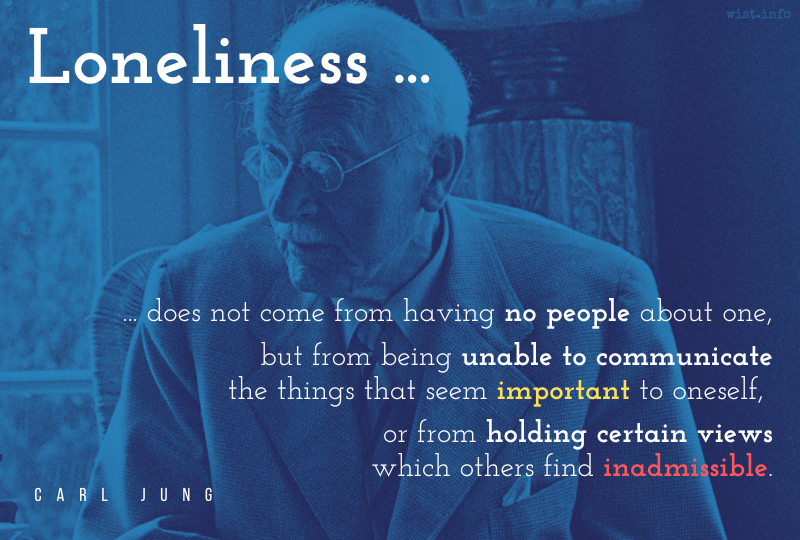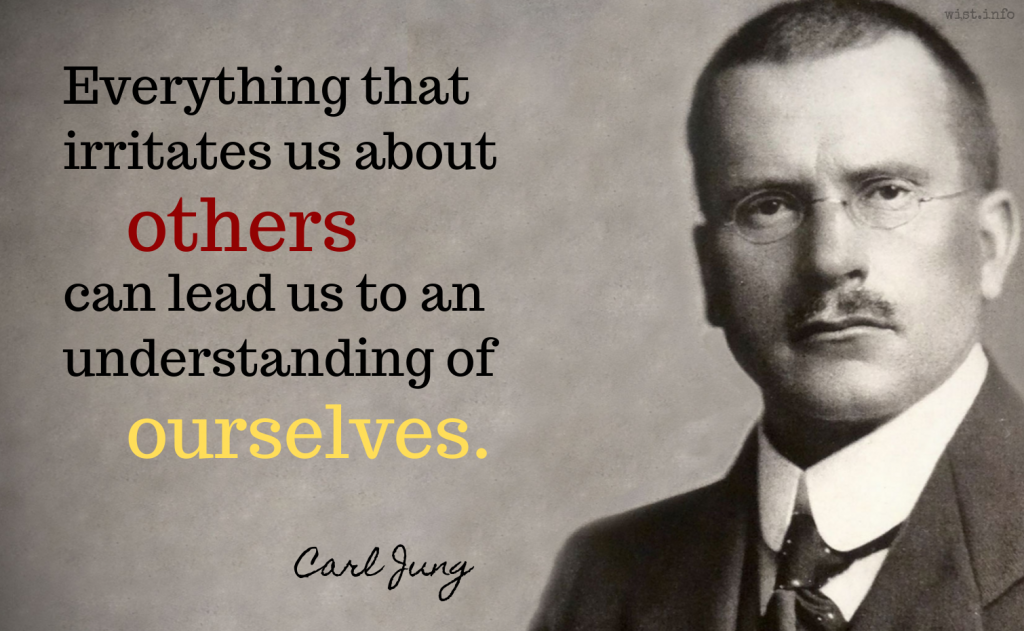Quotations by:
Jung, Carl
As any change must begin somewhere, it is the single individual who will experience it and carry it through. The change must indeed begin with an individual; it might be any one of us. Nobody can afford to look around and to wait for somebody else to do what he is loath to do himself.
The real existence of an enemy upon whom one can foist off everything evil is an enormous relief to one’s conscience. You can then at least say, without hesitation, who the devil is; you are quite certain that the cause of your misfortune is outside, and not your own attitude.
Deep down, below the surface of the average man’s conscience, he hears a voice whispering, “There is something not right,” no matter how much his rightness is supported by public opinion or by the moral code.
Anyone who wants to know the human psyche will learn next to nothing from experimental psychology. He would be better advised to [abandon exact science] put away his scholar’s gown, bid farewell to his study, and wander with human heart throughout the world. There in the horrors of prisons, lunatic asylums and hospitals, in drab suburban pubs, in brothels and gambling-hells, in the salons of the elegant, the Stock Exchanges, Socialist meetings, churches, revivalist gatherings and ecstatic sects, through love and hate, through the experience of passion in every form in his own body, he would reap richer stores of knowledge than text-books a foot thick could give him and he will know how to doctor the sick with a real knowledge of the human soul.
One looks back with appreciation to the brilliant teachers, but with gratitude to those who touched our human feelings. The curriculum is so much necessary raw material, but warmth is the vital element for the growing plant and for the soul of the child.
Carl Jung (1875-1961) Swiss psychologist
“The Gifted Child” (1942), The Development of Personality, sec. 250 (1954) [tr. Hull]
(Source)
Translated from "Der Begabte," Psychologie und Erziehung (1946).
His uncertainty forces the enthusiast to puff up his truths, of which he feels none too sure, and to win proselytes to his side in order that his followers may prove to himself the value and trustworthiness of his own convictions. … Only when convincing someone else does he feel safe from gnawing doubts.
Whereas I formerly believed it to be my bounden duty to call others to order, I must now admit that I need calling to order myself, and that I would do better to set my own house to rights first.
Carl Jung (1875-1961) Swiss psychologist
“The Spiritual Problem of Modern Man,” ¶ 162 (1928)
(Source)
Mistakes are, after all, the foundation of truth, and if a man does not know what a thing is, it is at least an increase in knowledge if he knows what it is not.
Thinking is difficult, therefore let the herd pronounce judgment!
Carl Jung (1875-1961) Swiss psychologist
Flying Saucers: A Modern Myth of Things Seen in the Skies, ch. 2 (1959) [tr. Hull]
(Source)
The motto of the "relatively unconscious man" who "clings to the commonplace, the obvious, the probable, the collectively valid." Reprinted in the The Collected Works of C.G. Jung - Civilization in Transition, vol. 10, ¶ 653.
Probable source of the frequently-attributed (but unfound) "Thinking is difficult. That's why most people judge."
My interests drew me in different directions. On the one hand I was powerfully attracted by science, with its truths based on facts; on the other hand I was fascinated by everything to do with comparative religion. […] In science I missed the factor of meaning; and in religion, that of empiricism.
Loneliness does not come from having no people about one, but from being unable to communicate the things that seem important to oneself, or from holding certain views which others find inadmissible.
Carl Jung (1875-1961) Swiss psychologist
Memories, Dreams, Reflections [Erinnerungen, Träume, Gedanken], “Retrospect” (1962) [with Aniela Jaffé; tr. Winston (1963)]
(Source)
Man always has some mental reservation, even in the face of divine decrees. Otherwise, where would be his freedom? And what would be the use of that freedom if it could not threaten Him who threatens it?
Everything that irritates us about others can lead us to an understanding of ourselves.
Carl Jung (1875-1961) Swiss psychologist
Memories, Dreams, Reflections [Erinnerungen, Träume, Gedanken], ch. 9 “Travels,” sec. 2 (1961; 1973 ed.) [with Aniela Jaffé] [tr. Winton/Winton (1963)]
(Source)
We cannot change anything unless we accept it. Condemnation does not liberate, it oppresses. I am the oppressor of the person I condemn, not his friend and fellow-sufferer. I do not in the least mean to say that we must never pass judgment in the case of persons whom we desire to help and improve. But if the doctor wishes to help a human being he must be able to accept him as he is. And he can do this in reality only when he has already seen and accepted himself as he is.
If people can be educated to see the lowly side of their own natures, it may be hoped that they will also learn to understand and to love their fellow men better. A little less hypocrisy and a little more tolerance toward oneself can only have good results in respect for our neighbors, for we are all too prone to transfer to our fellows the injustice and violence we inflict upon our own natures.
We should not pretend to understand the world only by the intellect; we apprehend it just as much by feeling. Therefore, the judgment of the intellect is, at best, only the half of truth, and must, if it be honest, also come to an understanding of its inadequacy.
Without necessity, nothing budges, the human personality least of all. It is tremendously conservative, not to say torpid. Only acute necessity is able to rouse it. The developing personality obeys no caprice, no command, no insight, only brute necessity.
The erotic instinct is something questionable, and will always be so whatever a future set of laws may have to say on the matter. It belongs, on the one hand, to the original animal nature of man, which will exist as long as man has an animal body. On the other hand, it is connected with the highest forms of the spirit. But it blooms only when the spirit and instinct are in true harmony. If one or the other aspect is missing, then an injury occurs, or at least there is a one-sided lack of balance which easily slips into the pathological. Too much of the animal disfigures the civilized human being, too much culture makes a sick animal.
You can take away a man’s gods, but only to give him others in return.



